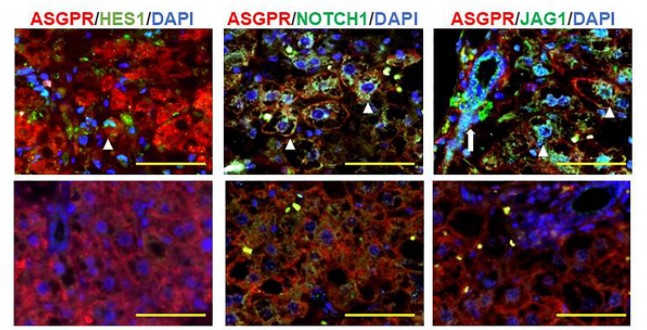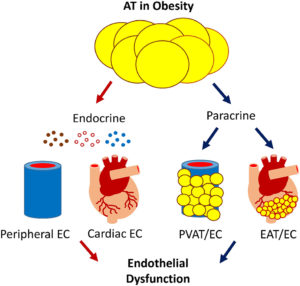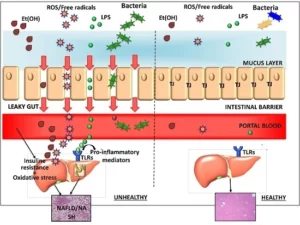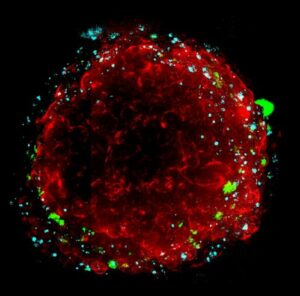Introduction
Adipose tissue-derived stem cells (ADSCs) are mesenchymal stem cells (MSCs) that are obtained from abundant adipose tissue, adherent on plastic culture flasks can be expanded in vitro, and have the capacity to differentiate into multiple cell lineages.
Unlike bone marrow-derived MSCs, ADSCs can be obtained from abundant adipose tissue by a minimally invasive procedure, which results in a high number of cells.
Nonalcoholic steatohepatitis (NASH) is liver inflammation and damage caused by a buildup of fat in the liver. It is part of a group of conditions called nonalcoholic fatty liver disease.
You may be told you have a “fatty liver.” Many people have a buildup of fat in the liver, and for most people, it causes no symptoms and no problems. But in some people, the fat causes inflammation and damages cells in the liver. Because of the damage, the liver doesn’t work as well as it should.

This study demonstrated the repairing/restorative effect of ADSC treatment on hepatocytes of NASH mice, which was mediated by Notch signaling. Further studies are required to confirm the therapeutic effect of ADSCs on NASH and the contribution of Notch signaling.
Understanding the molecular mechanisms underlying the repairing/restorative effect of ADSCs will contribute to the development of an effective therapeutic strategy for the treatment of emerging chronic liver disease, NASH.
How to culture vascularized & immunocompetent 3D models in a standard Multiwell
Abstract
The authors state that “Adipose tissue-derived stem cells (ADSCs) have been suggested as a novel treatment for non-alcoholic steatohepatitis (NASH); however, the mechanisms underlying their therapeutic effect remain poorly understood. In this study, we aimed to investigate the association of Notch signaling, which is crucial for cellular proliferation and differentiation in ADSC-mediated treatment of NASH.
Flow cytometry analysis of ADSCs showed that they expressed the Notch ligands JAG1, DLL1, and DLL4. The expression of genes associated with the Notch signaling pathway was attenuated in hepatocytes of NASH model mice. We further observed ADSC-mediated activation of Notch signaling in these hepatocytes in addition to an increase in proliferating cell nuclear antigen+ cells and a decrease in TdT-mediated dUTP-biotin nick-end labeling+ apoptotic cells.
Co-culture of palmitic acid-induced steatotic hepatocytes and ADSCs resulted in the activation of Notch signaling and reduction of apoptosis of steatotic hepatocytes. Moreover, inhibition of Notch signaling by a γ-secretase inhibitor and knockdown of Notch ligands using siRNA attenuated the anti-apoptotic effect of co-cultured ADSCs in vitro.
Our findings show that the Notch signaling pathway is involved in the inhibition of apoptosis and restoration of cellular proliferation of hepatocytes from NASH mice following ADSC treatment.”
References
Ishida, K., Seki, A., Kawaguchi, K., Nasti, A., Yamato, M., Inui, H., Komura, T., Yamashita, T., Arai, K., Yamashita, T., Mizukoshi, E., Honda, M., Wada, T., Harada, K., Kaneko, S., & Sakai, Y. (2021). Restorative effect of adipose tissue-derived stem cells on impaired hepatocytes through Notch signaling in non-alcoholic steatohepatitis mice. Stem Cell Research, 54, 102425. https://doi.org/10.1016/j.scr.2021.102425
FAQ
Adipose tissue-derived stem cells, or ADSCs, are a type of mesenchymal stem cell. They are sourced from plentiful adipose tissue. These cells are noted for their ability to adhere to plastic culture flasks. They can be expanded in vitro, meaning they are grown in a laboratory setting. ADSCs also possess the capacity to change into multiple cell lineages. Their collection is considered advantageous when compared to bone marrow-derived MSCs. ADSCs are obtained from abundant tissue through a minimally invasive procedure. This process results in a high number of cells, making them a readily available resource. This contrasts with the more involved methods required for bone marrow collection.
Nonalcoholic steatohepatitis, known as NASH, is a medical condition. It is defined by liver inflammation and damage. This is caused by an accumulation of fat in the liver. NASH is part of a wider group of conditions called nonalcoholic fatty liver disease. A person may be told they have a "fatty liver". For many people, this build-up of fat does not cause symptoms or problems. However, in some individuals, the fat accumulation leads to inflammation. This inflammation damages the cells within the liver. Because of this cellular damage, the liver is not able to work as well as it should.
This study examined the potential for ADSCs to be a new treatment for nonalcoholic steatohepatitis. The mechanisms for this therapeutic effect are not well understood. The investigation was intended to look at the association of Notch signalling. This pathway is important for cellular proliferation and change. The study explored how ADSC-mediated treatment of NASH might involve this pathway. The research demonstrated a restorative effect of ADSC treatment on the liver cells, or hepatocytes, of mice with NASH. This effect was found to be mediated by Notch signalling. A better understanding of these molecular mechanisms may aid the creation of effective therapeutic strategies for this chronic liver disease.
The study’s findings showed that the Notch signalling pathway is involved in the restorative process. Examination of the ADSCs showed they expressed the Notch ligands JAG1, DLL1, and DLL4. In the liver cells of NASH model mice, the expression of genes associated with this pathway was reduced. Treatment with ADSCs led to the activation of Notch signalling in these hepatocytes. This activation was observed along with an increase in proliferating cells. A decrease in apoptotic, or dying, cells was also seen. Co-culture experiments further confirmed these observations. When Notch signalling was blocked, the anti-apoptotic effect of the ADSCs was lessened. This indicates the pathway is part of the mechanism for inhibiting apoptosis and restoring cell proliferation.





